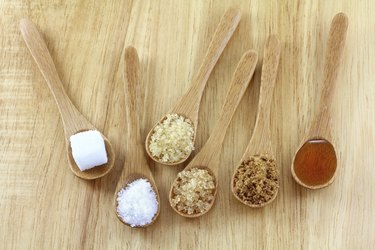
Sugar intolerance, also known as dietary fructose intolerance or sugar malabsorption, is a digestive disorder that affects nearly one-third of all adults, according to the website Food Intolerance Diagnostics. Because the primary symptoms of sugar intolerance -- including gas, bloating, belching, abdominal pain and diarrhea -- are similar to those of irritable bowl syndrome, lactose intolerance, gluten intolerance and other digestive conditions, it's important to seek a proper diagnosis before making any major changes to your diet.
Foods to Avoid
Video of the Day
One of the primary ways to manage or prevent symptoms of sugar intolerance is to avoid high-fructose foods and beverages, including dried fruit, canned fruit, fruit juice, applesauce and other processed fruit products.
Video of the Day
Honey, maple syrup and any processed food or drink that's high in sugar -- particularly those made with high-fructose corn syrup, including many kinds of soda -- also tend to be poorly tolerated. Fructose-rich fresh fruits that may be problematic include apples, pears, watermelon and mangoes.
Asparagus, artichokes and tomatoes are higher in fructose than most vegetables and may not be well tolerated, while foods that contain fructans, including garlic, leeks, onions and whole-wheat products, can also trigger symptoms.
Other Considerations
If you've been diagnosed with sugar intolerance, work with a dietitian to create a meal plan that addresses the problem without sacrificing nutrition. The fructose content of processed foods isn't always easy to discern without professional guidance. In addition, many fresh fruits may be well tolerated in small portions, so avoiding them isn't necessary. See your physician if a low-fructose diet doesn't alleviate your symptoms -- sugar intolerance often co-exists with another food intolerance or allergy.